As you know, I like to do my best to sort through the new Christian books that are released each month to see what stands out as being not only new, but also particularly notable. I received quite a number of new titles in March and narrowed the list down to the ones below. I have included the editorial description for each. I hope there’s something here that catches your eye!
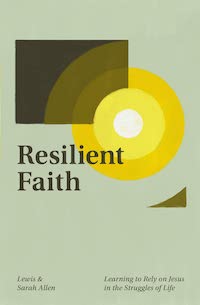 Resilient Faith: Learning to Rely on Jesus in the Struggles of Life by Lewis and Sarah Allen. “Authors Lewis and Sarah Allen propose that while the world may teach us one way to approach challenges, there is a better way—complete dependence on Christ and pursuit of wise living. With the help of the Holy Spirit, Christians are able to live more joy-filled lives in the midst of adversity. In a conversational and personal tone, the Allens walk through key biblical passages as they relate to challenges and share stories, case studies, and illustrations to encourage us to rely on Christ and commit to his church in the battle of Christian life.” (Buy it at Amazon)
Resilient Faith: Learning to Rely on Jesus in the Struggles of Life by Lewis and Sarah Allen. “Authors Lewis and Sarah Allen propose that while the world may teach us one way to approach challenges, there is a better way—complete dependence on Christ and pursuit of wise living. With the help of the Holy Spirit, Christians are able to live more joy-filled lives in the midst of adversity. In a conversational and personal tone, the Allens walk through key biblical passages as they relate to challenges and share stories, case studies, and illustrations to encourage us to rely on Christ and commit to his church in the battle of Christian life.” (Buy it at Amazon)
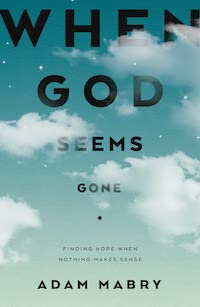 When God Seems Gone: Finding Hope When Nothing Makes Sense by Adam Mabry. “What do you do when it feels like God isn’t there—when the state of the world, our own suffering, or the struggles of those we know suggest that God is absent? When you’ve experienced soul-crushing silence from heaven, despite your fervent supplications. Using the book of Habakkuk, as well as his own personal experience of deep suffering, Adam Mabry examines the art of lament—how to cry out to God in desperation from a place of faith and hope. At the end, there are practical suggestions for what you can do to keep faith even in times of darkness and doubt. Readers will learn that God is big enough and good enough to handle hard questions and that his sovereign silence is filled with purpose for their lives. They will be encouraged to keep trusting God even when he seems silent, slow, unfair, different, or wrong.” (Buy it at Amazon)
When God Seems Gone: Finding Hope When Nothing Makes Sense by Adam Mabry. “What do you do when it feels like God isn’t there—when the state of the world, our own suffering, or the struggles of those we know suggest that God is absent? When you’ve experienced soul-crushing silence from heaven, despite your fervent supplications. Using the book of Habakkuk, as well as his own personal experience of deep suffering, Adam Mabry examines the art of lament—how to cry out to God in desperation from a place of faith and hope. At the end, there are practical suggestions for what you can do to keep faith even in times of darkness and doubt. Readers will learn that God is big enough and good enough to handle hard questions and that his sovereign silence is filled with purpose for their lives. They will be encouraged to keep trusting God even when he seems silent, slow, unfair, different, or wrong.” (Buy it at Amazon)
 Come and See: The Journey of Knowing God through Scripture by Jonathan Pennington. “In Come and See, Jonathan Pennington helps readers understand what it means to know God from the Bible and details 3 effective approaches to interpreting Scripture. Using the engaging analogy of a road trip, he introduces 3 friends who each have distinct, clear ways of navigating the Bible: informational (understanding genres in Scripture and avoiding exegetical mistakes); theological (reading canonically, traditionally, and creedally); and transformational (focusing on the goal of reading Scripture, our posture as readers, and the role of the Holy Spirit). Pennington gives detailed advice for employing all 3 reading modes, equipping readers to gain wisdom and know God better.” (Buy it at Amazon)
Come and See: The Journey of Knowing God through Scripture by Jonathan Pennington. “In Come and See, Jonathan Pennington helps readers understand what it means to know God from the Bible and details 3 effective approaches to interpreting Scripture. Using the engaging analogy of a road trip, he introduces 3 friends who each have distinct, clear ways of navigating the Bible: informational (understanding genres in Scripture and avoiding exegetical mistakes); theological (reading canonically, traditionally, and creedally); and transformational (focusing on the goal of reading Scripture, our posture as readers, and the role of the Holy Spirit). Pennington gives detailed advice for employing all 3 reading modes, equipping readers to gain wisdom and know God better.” (Buy it at Amazon)
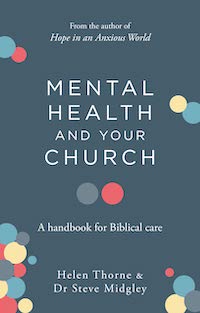 Mental Health and Your Church: A Handbook for Biblical Care by Helen Thorne & Steve Midgley. “Many people are struggling with mental-health conditions, exacerbated by the COVID-19 pandemic and life in our image-conscious culture. Statistics tell us that, worldwide, one in six of us will have experienced a mental-health struggle in the past week, and serious depression is the second-leading cause of disability (Mental Health Foundation). That means there are brothers and sisters in our church families battling with thoughts, feelings, impulses, and even voices that distract, drag down, and nudge them towards despair. But when it comes to helping, it can be tricky to know where to begin, especially if we have very little knowledge of mental illnesses and are afraid of making things worse by saying and doing the wrong things. This wise, compassionate, and practical book … will help readers understand and respond with biblical wisdom to people who are struggling with their mental health. While acknowledging the importance of liaising responsibly with medics and counsellors, this book focuses on equipping readers to play their part in making churches places where those who struggle with mental-health conditions are welcomed, understood, nurtured, and supported: a foretaste of the new creation.” (Buy it at Amazon)
Mental Health and Your Church: A Handbook for Biblical Care by Helen Thorne & Steve Midgley. “Many people are struggling with mental-health conditions, exacerbated by the COVID-19 pandemic and life in our image-conscious culture. Statistics tell us that, worldwide, one in six of us will have experienced a mental-health struggle in the past week, and serious depression is the second-leading cause of disability (Mental Health Foundation). That means there are brothers and sisters in our church families battling with thoughts, feelings, impulses, and even voices that distract, drag down, and nudge them towards despair. But when it comes to helping, it can be tricky to know where to begin, especially if we have very little knowledge of mental illnesses and are afraid of making things worse by saying and doing the wrong things. This wise, compassionate, and practical book … will help readers understand and respond with biblical wisdom to people who are struggling with their mental health. While acknowledging the importance of liaising responsibly with medics and counsellors, this book focuses on equipping readers to play their part in making churches places where those who struggle with mental-health conditions are welcomed, understood, nurtured, and supported: a foretaste of the new creation.” (Buy it at Amazon)
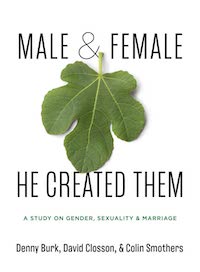 Male and Female He Created Them: A Study on Gender, Sexuality, & Marriage by Denny Burk,Colin Smothers and David Closson. “Male & Female He Created Them is a study on gender, sexuality, and marriage. Authored by Denny Burk, David Closson, and Colin Smothers, it presents a biblical vision for contested issues such as homosexuality, transgenderism, and marriage. By the completion of this book, readers will have a better grasp on the Bible’s teaching about our identities as male and female, created in the image of God, and know how to apply Scripture to these issues in their ministries at church, home, and work.” (Buy it at Amazon)
Male and Female He Created Them: A Study on Gender, Sexuality, & Marriage by Denny Burk,Colin Smothers and David Closson. “Male & Female He Created Them is a study on gender, sexuality, and marriage. Authored by Denny Burk, David Closson, and Colin Smothers, it presents a biblical vision for contested issues such as homosexuality, transgenderism, and marriage. By the completion of this book, readers will have a better grasp on the Bible’s teaching about our identities as male and female, created in the image of God, and know how to apply Scripture to these issues in their ministries at church, home, and work.” (Buy it at Amazon)
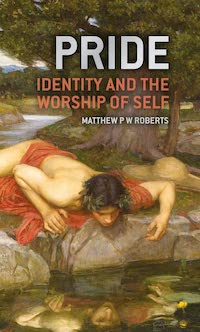 Pride: Identity and the Worship of Self by Matthew P. W. Roberts. “Our culture is obsessed with identity and it has been the cause of tense interaction with (and within) the Church. Rather than being a new challenge to the Christian faith, however, the identity issue is a very old one; it is fundamentally one of idolatry. Who we are, who we think we are, and how God in Christ restores our knowledge of ourselves in covenant with him, are central Biblical themes. But these things will only appear with clarity if we have the courage to tackle the idolatries of our own age at the root, and stand true to our calling as Christians to worship God and him alone.” (Buy it at Amazon)
Pride: Identity and the Worship of Self by Matthew P. W. Roberts. “Our culture is obsessed with identity and it has been the cause of tense interaction with (and within) the Church. Rather than being a new challenge to the Christian faith, however, the identity issue is a very old one; it is fundamentally one of idolatry. Who we are, who we think we are, and how God in Christ restores our knowledge of ourselves in covenant with him, are central Biblical themes. But these things will only appear with clarity if we have the courage to tackle the idolatries of our own age at the root, and stand true to our calling as Christians to worship God and him alone.” (Buy it at Amazon)
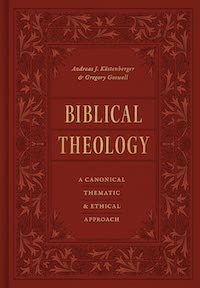 Biblical Theology: A Canonical, Thematic, and Ethical Approach by Andreas J. Köstenberger and Gregory Goswell. “In this clear, logical guide, Andreas J. Köstenberger and Gregory Goswell explain how to interpret Scripture from three effective viewpoints: canonical, thematic, and ethical. Biblical Theology is arranged book by book from the Old Testament (using the Hebrew order) through the New Testament. For each text, Kostenberger and Goswell analyze key biblical-theological themes, discussing the book’s place in the overall storyline of Scripture. Next, they focus on the ethical component, showing how God seeks to transform the lives of his people through the inspired text. Following this technique, readers will better understand the theology of each book and its author.” (Buy it at Amazon or Westminster Books)
Biblical Theology: A Canonical, Thematic, and Ethical Approach by Andreas J. Köstenberger and Gregory Goswell. “In this clear, logical guide, Andreas J. Köstenberger and Gregory Goswell explain how to interpret Scripture from three effective viewpoints: canonical, thematic, and ethical. Biblical Theology is arranged book by book from the Old Testament (using the Hebrew order) through the New Testament. For each text, Kostenberger and Goswell analyze key biblical-theological themes, discussing the book’s place in the overall storyline of Scripture. Next, they focus on the ethical component, showing how God seeks to transform the lives of his people through the inspired text. Following this technique, readers will better understand the theology of each book and its author.” (Buy it at Amazon or Westminster Books)
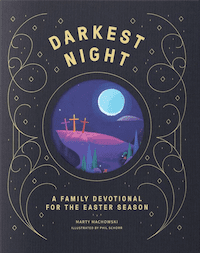 Darkest Night Brightest Day: A Family Devotional for the Easter Season by Marty Machowski. “Start a new Easter season tradition with your family by reading this beautifully illustrated “upside-down” book from Marty Machowski that includes fourteen Bible stories. The first side, Darkest Night, has seven stories that recount the events of Passion week ending with Christ’s crucifixion and burial. Flip the book over and continue by reading Brightest Day with seven more stories that progress from Christ’s resurrection through Pentecost. Children are sure to remember the contrast between the darkness at the death of our Lord and the light-filled events from Christ’s resurrection onward. Machowski weaves each Gospel account together into one harmonized story and provides questions for family discussion. Focusing on the main events the week of the crucifixion, Darkest Night is designed for families to read one story each day, beginning on Palm Sunday. Once the week ends, they will start with Brightest Day on Easter Sunday. The stories for the week following Easter recount appearances of Jesus after the resurrection, his ascension, and Pentecost. This beautiful hardback book, illustrated by Phil Shorr, is sure to become a treasured favorite of the family to be used every Easter as a reminder of how God turned the darkest night into the brightest day.” (Buy it at Amazon or Westminster Books)
Darkest Night Brightest Day: A Family Devotional for the Easter Season by Marty Machowski. “Start a new Easter season tradition with your family by reading this beautifully illustrated “upside-down” book from Marty Machowski that includes fourteen Bible stories. The first side, Darkest Night, has seven stories that recount the events of Passion week ending with Christ’s crucifixion and burial. Flip the book over and continue by reading Brightest Day with seven more stories that progress from Christ’s resurrection through Pentecost. Children are sure to remember the contrast between the darkness at the death of our Lord and the light-filled events from Christ’s resurrection onward. Machowski weaves each Gospel account together into one harmonized story and provides questions for family discussion. Focusing on the main events the week of the crucifixion, Darkest Night is designed for families to read one story each day, beginning on Palm Sunday. Once the week ends, they will start with Brightest Day on Easter Sunday. The stories for the week following Easter recount appearances of Jesus after the resurrection, his ascension, and Pentecost. This beautiful hardback book, illustrated by Phil Shorr, is sure to become a treasured favorite of the family to be used every Easter as a reminder of how God turned the darkest night into the brightest day.” (Buy it at Amazon or Westminster Books)
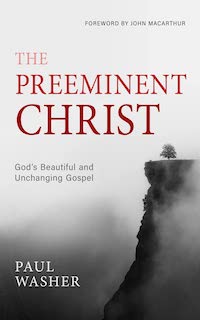 The Preeminent Christ: God’s Beautiful and Unchanging Gospel by Paul Washer. “In The Preeminent Christ, Paul Washer declares the unmatched significance of the good news of Jesus Christ. Compelled by a desire for men to know God’s love, Washer draws from the church’s greatest theologians to herald Christ’s centrality in revelation, salvation, sanctification, study, proclamation, and glory. The Preeminent Christ will stimulate readers to forsake their tendency to view worldly “needs” as central by zealously seeking this Christ in the gospel. Contents 1. A Prolegomenon 2. An Apology 3. The Essential Content of the Gospel 4. The Same Gospel through the Ages 5. The Preeminence of the Gospel 6. The Preeminent Revelation of God 7. The Preeminent Message of Salvation 8. The Preeminent Means of Sanctification 9. The Preeminent Subject of Study 10. The Preeminent Subject of Preaching 11. The Preeminent Subject of Glorying 12. A Warning against the Neglect of the Gospel 13. Final Exhortation.” (Buy it at Amazon)
The Preeminent Christ: God’s Beautiful and Unchanging Gospel by Paul Washer. “In The Preeminent Christ, Paul Washer declares the unmatched significance of the good news of Jesus Christ. Compelled by a desire for men to know God’s love, Washer draws from the church’s greatest theologians to herald Christ’s centrality in revelation, salvation, sanctification, study, proclamation, and glory. The Preeminent Christ will stimulate readers to forsake their tendency to view worldly “needs” as central by zealously seeking this Christ in the gospel. Contents 1. A Prolegomenon 2. An Apology 3. The Essential Content of the Gospel 4. The Same Gospel through the Ages 5. The Preeminence of the Gospel 6. The Preeminent Revelation of God 7. The Preeminent Message of Salvation 8. The Preeminent Means of Sanctification 9. The Preeminent Subject of Study 10. The Preeminent Subject of Preaching 11. The Preeminent Subject of Glorying 12. A Warning against the Neglect of the Gospel 13. Final Exhortation.” (Buy it at Amazon)
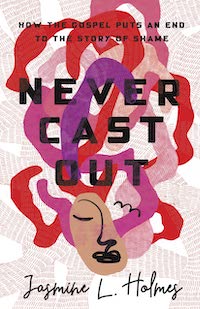 Never Cast Out: How the Gospel Puts an End to the Story of Shame by Jasmine Holmes. “Body shaming. Marriage shaming. Single shaming. Mom shaming. Lifestyle shaming. Religious shaming. It seems no matter which direction we turn, women can’t shake the shame that is constantly piled on top of us. Author and podcaster Jasmine L. Holmes knows this struggle all too well. Though shame has been a constant companion (and even a snare) throughout her life, God has broken the chains of shame in Jasmine’s life through the power of the gospel. In this Christ-centered, empowering book, prepare to discover: The story of shame—where it comes from, what it is, what makes it different from guilt or conviction, and why it’s so pervasive; The problem with shame—why the typical methods of throwing off shame don’t actually work; The end of shame—how Jesus puts an end to shame by offering a better covering, a better image, and a better message than the world can; The way to fight shame—how to use practical and powerful ways to fight shame in daily life, breaking its chains in the power of the gospel and resting in the One who has taken all your shame away for good.” (Buy it at Amazon or Westminster Books)
Never Cast Out: How the Gospel Puts an End to the Story of Shame by Jasmine Holmes. “Body shaming. Marriage shaming. Single shaming. Mom shaming. Lifestyle shaming. Religious shaming. It seems no matter which direction we turn, women can’t shake the shame that is constantly piled on top of us. Author and podcaster Jasmine L. Holmes knows this struggle all too well. Though shame has been a constant companion (and even a snare) throughout her life, God has broken the chains of shame in Jasmine’s life through the power of the gospel. In this Christ-centered, empowering book, prepare to discover: The story of shame—where it comes from, what it is, what makes it different from guilt or conviction, and why it’s so pervasive; The problem with shame—why the typical methods of throwing off shame don’t actually work; The end of shame—how Jesus puts an end to shame by offering a better covering, a better image, and a better message than the world can; The way to fight shame—how to use practical and powerful ways to fight shame in daily life, breaking its chains in the power of the gospel and resting in the One who has taken all your shame away for good.” (Buy it at Amazon or Westminster Books)
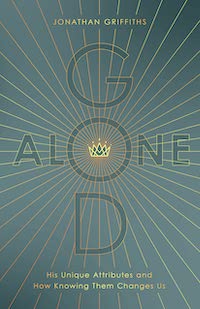 God Alone: His Unique Attributes and How Knowing Them Changes Us by Jonathan Griffiths. “We are living in a me-focused, treat-yourself world—a world that oppressively encourages us to focus on ourselves. But a life turned inward–rather than focused on God—brings peril and confusion. When we fail to know God properly, we become selfish and hopeless. But a renewed understanding of who God is changes that. Pastor Jonathan Griffiths shows us how God Alone can transform us at a root level. With pastoral warmth and heart, Griffiths shows us the character of God in all His beauty and goodness. Readers will gain knowledge of God’s attributes—that He is eternal, all-knowing, and all-wise. Readers discover what it means that God is omnipotent, unchanging, and omnipresent. And through this knowledge, trust, hope, and joy emerge. Confidence grows when we have a robust understanding of God’s love. This book is both a plea for the people of God to know Him intimately and, at the same time, an invitation to those who do not yet know Him—come and experience the wonderful, beautiful, powerful God revealed in Scripture.” (Buy it at Amazon or Westminster Books)
God Alone: His Unique Attributes and How Knowing Them Changes Us by Jonathan Griffiths. “We are living in a me-focused, treat-yourself world—a world that oppressively encourages us to focus on ourselves. But a life turned inward–rather than focused on God—brings peril and confusion. When we fail to know God properly, we become selfish and hopeless. But a renewed understanding of who God is changes that. Pastor Jonathan Griffiths shows us how God Alone can transform us at a root level. With pastoral warmth and heart, Griffiths shows us the character of God in all His beauty and goodness. Readers will gain knowledge of God’s attributes—that He is eternal, all-knowing, and all-wise. Readers discover what it means that God is omnipotent, unchanging, and omnipresent. And through this knowledge, trust, hope, and joy emerge. Confidence grows when we have a robust understanding of God’s love. This book is both a plea for the people of God to know Him intimately and, at the same time, an invitation to those who do not yet know Him—come and experience the wonderful, beautiful, powerful God revealed in Scripture.” (Buy it at Amazon or Westminster Books)
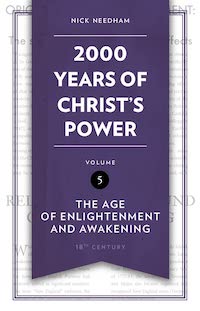 2,000 Years of Christ’s Power Vol. 5: The Age of Enlightenment and Awakening by Nick Needham. “In many ways, I confess I do not feel especially at home in the Age of Reason. My personal roots are far more among those of the Early Church. Still, I gladly admit I cannot help feeling my heart kindled as I read about the mighty deeds wrought in and through the Evangelical preachers of that age. Thoroughly researched with beautifully linked arguments, biographies, context and discussions, Needham provides a riveting text: balancing fact and understanding in the wisdom of experience. The book offers a wealth of knowledge for pastors, missionaries, students and professors as they pursue their own education into the response of Christians during the 18th century towards these shifts in the tides of the affairs of men. Covering the period bracketing the Enlightenment Nick Needham’s new volume in the 2000 Years of Christ’s Power series, covers the social, economic, political and evangelical changes across two continents.” (Buy it at Amazon or Westminster Books)
2,000 Years of Christ’s Power Vol. 5: The Age of Enlightenment and Awakening by Nick Needham. “In many ways, I confess I do not feel especially at home in the Age of Reason. My personal roots are far more among those of the Early Church. Still, I gladly admit I cannot help feeling my heart kindled as I read about the mighty deeds wrought in and through the Evangelical preachers of that age. Thoroughly researched with beautifully linked arguments, biographies, context and discussions, Needham provides a riveting text: balancing fact and understanding in the wisdom of experience. The book offers a wealth of knowledge for pastors, missionaries, students and professors as they pursue their own education into the response of Christians during the 18th century towards these shifts in the tides of the affairs of men. Covering the period bracketing the Enlightenment Nick Needham’s new volume in the 2000 Years of Christ’s Power series, covers the social, economic, political and evangelical changes across two continents.” (Buy it at Amazon or Westminster Books)
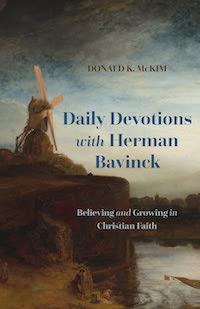 Daily Devotions with Herman Bavinck: Believing and Growing in Christian Faith by Donald K. McKim. “Herman Bavinck (1854–1921) was a significant Reformed theologian whose importance continues to this day. In eighty-four brief devotional readings accompanied by Scripture, Donald McKim explores Bavinck’s thought in order to deepen readers’ understanding and faith.” (Buy it at Amazon or Westminster Books)
Daily Devotions with Herman Bavinck: Believing and Growing in Christian Faith by Donald K. McKim. “Herman Bavinck (1854–1921) was a significant Reformed theologian whose importance continues to this day. In eighty-four brief devotional readings accompanied by Scripture, Donald McKim explores Bavinck’s thought in order to deepen readers’ understanding and faith.” (Buy it at Amazon or Westminster Books)









